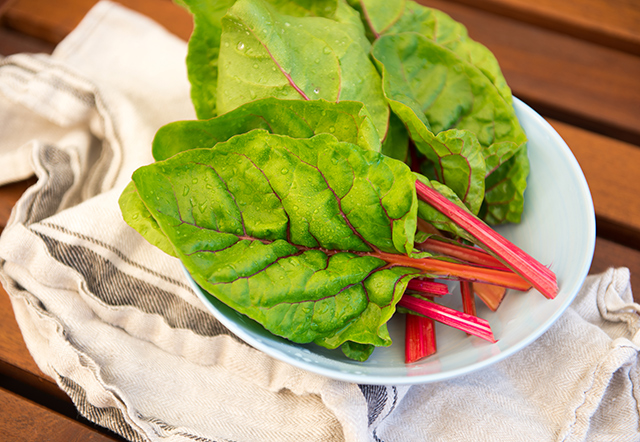6 Reasons to eat antioxidant-rich Swiss chard
03/07/2019 // Michelle Simmons // Views
Tags: antioxidants, Beta vulgaris, Chard, crab beet, food as medicine, food cures, food is medicine, foodcures, goodfood, goodhealth, healing foods, heart health, Leafy greens, medicinal plants, natural cures, natural healing, natural medicine, natural remedies, proper nutrition, sea beet, silverbeet, spinach beet, superfoods, swiss chard, vegetables, Veggies

This leafy green is loaded with powerful antioxidants -- having up to 13 different polyphenol antioxidants, 19 different types of betaxanthin antioxidants, and nine types of betacyanins -- which are responsible for many of its health benefits, such as:
- Enhancing nerve and muscle function: Swiss chard is rich in calcium, magnesium, potassium, and other minerals that keep the nervous and muscular systems healthy. Magnesium, in particular, helps enhance circulation and reduces pain and muscle cramps brought about by magnesium deficiency. In addition, this mineral also wards off stress-related symptoms that can impair the nervous system. When the functioning of the nervous system is disrupted, health problems such as headaches, mood swings, sleep problems, diabetes, and high blood pressure occur.
- Improving eye health: Swiss chard contains zeaxanthin and lutein -- carotenoids which are best known for protecting the eyes. These two have the ability to absorb damaging blue light that enters the eye before it can harm the retina. They can protect against age-related eye disorders like glaucoma, cataracts, macular degeneration, and night blindness. In addition, Swiss chard contains betalains that also protect the nervous system, including specialized nerve signaling that is important for communications between the brain and eyes.
- Keeping the heart healthy: This antioxidant-rich vegetable also improves heart health in many ways by simply reducing inflammation, which increases the risk of stroke, heart attacks, and other forms of cardiovascular disease. Inflammation also makes conditions like high cholesterol and high blood pressure worse. In addition to its antioxidant content, Swiss chard's trace minerals – calcium, copper, iron, magnesium, and potassium – help improve blood vessel health, enhance blood flow, and regulate heartbeat. In a study published in the British Journal of Clinical Pharmacology, researchers found that foods rich in nitrates, including Swiss chard, provide vascular benefits. They found that nitrate-rich foods inhibit platelet aggregation, lower blood pressure, and improve or preserve endothelial function. (Related: Eat more Swiss chard to enhance endurance and lower your blood pressure.)
- Managing diabetes: People with prediabetes, diabetes, and other types of insulin resistance or metabolic syndrome will benefit from eating Swiss chard. It contains alpha-lipoic acid, which is an antioxidant that has been reported to increase insulin sensitivity, lower blood sugar levels, and prevent oxidative stress-induced changes in diabetics. Evidence also shows that this antioxidant can reduce autonomic or peripheral neuropathy in those with diabetes. Moreover, Swiss chard contains certain flavonoids that help inhibit alpha-glucosidase activity, which breaks down carbohydrates into simple sugars. This, in turn, aids in blood sugar control. In addition, Swiss chard has a positive effect on pancreatic beta cells, which regulate insulin production.
- Strengthening the bones: Swiss chard also helps keep the bones healthy because of its vitamin K and calcium content. These nutrients are important for maintaining skeletal structure, mineral density, and bone strength.
- Warding off cancer: Research shows that Swiss chard helps fight cancer because of its anti-cancer nutrients, such as quercetin, beta-carotene, vitexin, various betalains, carotenoids, and chlorophyll. In a study published in the journal Phytochemical Analysis, researchers found that Swiss chard extract can stop the proliferation of human cancer cells.
Reap the benefits of Swiss chard by adding it to your diet. You can use it in many dishes, including salads, soups, pasta, and dips; add it to your smoothie; and make it into healthy chips.
Sources include:
Related Topics
antioxidants Beta vulgaris Chard crab beet food as medicine food cures food is medicine foodcures goodfood goodhealth healing foods heart health Leafy greens medicinal plants natural cures natural healing natural medicine natural remedies proper nutrition sea beet silverbeet spinach beet superfoods swiss chard vegetables VeggiesLatest News
Related News
11/21/2023 / By Arsenio Toledo
11/21/2023 / By Zoey Sky
11/20/2023 / By Arsenio Toledo
11/17/2023 / By Zoey Sky
11/05/2023 / By Lance D Johnson
10/25/2023 / By Olivia Cook
Take Action:
Support Natural News by linking to this article from your website.
Permalink to this article:
Copy
Embed article link:
Copy
Reprinting this article:
Non-commercial use is permitted with credit to NaturalNews.com (including a clickable link).
Please contact us for more information.
Please contact us for more information.























